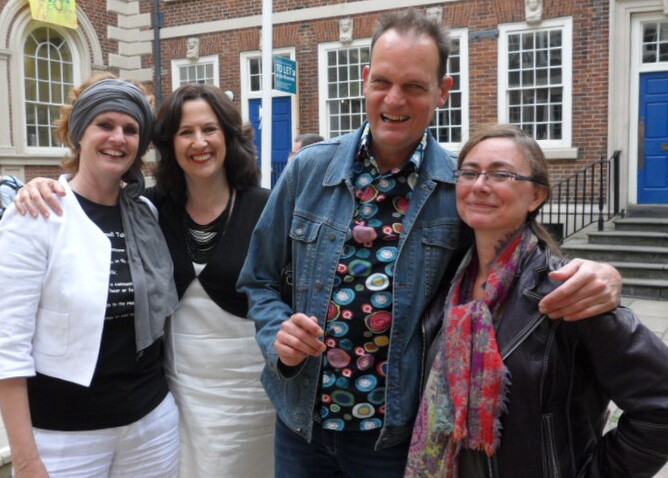Over the summer I had the pleasure of joining some of the events organised by Liverpool’s Da Da Fest which formed their vibrant international festival celebrating the work and talents of deaf and disabled artists and performers. I could easily have spent half a day immersed in the Niet Normaal exhibition which pushed provocatively at the boundaries of what is ‘normal’. One of the exhibits I could not tear myself away from was by Ben Cove. See below.
What reaction do you have to this? Mine was first laughter, then a long pause as possible references piled up – the economic recession, social disintegration, cuts, unemployment, illness, disability… a child’s fearful question to a parent: ‘Will everything be all right?’ yet optimism survives. I love the way Cove so simply ‘twisted’ the language to offer us the chance to reflect; one work says so much.
At the festival opening event, Dutch comedian, Vincent Bijlo’s fast-paced dark humour was reinforced by his deaf-blindness: ‘Seen what disabled people are achieving these days? Amazing! A man with no legs climbing Kilimanjaro? Makes me feel ashamed. I’ll get people on the street asking me “What are you doing? Why aren't you off climbing Kilimanjaro or something?”’.
One of the silliest questions I have ever been asked was by a man at the Foreign Office: ‘You play music? Well what do you get from it?’. Although I sort of understood the question – for him music is just sound, presumably – I was still appalled by it. Everyone can feel rhythm. A perfectly co-ordinated symphony orchestra or quartet, breathing together, creates so much more than a bunch of sounds. How was I to start to explain to this person that as music had dominated over half my life, there was simply no question of it somehow disappearing just because I had become deaf? How could I get across to him the sheer pleasure (as well as terror) of sitting in my local orchestra rehearsal and making my contribution to playing something with everyone else, following the music – being part of it? [Click here for my local orchestra’s website.]
In fact I didn’t bother. But having recently seen the 5 ways to well being, I realise that playing music involves most if not all of the recommended activities: connect, be active, take notice, keep learning and give. This helps to explain how music engrosses us so well.
On holiday with my dad in Seville last year, we tracked down a flamenco dive, well off the beaten track. In fact it was so well off the beaten track that took approximately 2 hours to find it, including the requisite refreshment breaks. But it was worth it. There were just three performers in a large, extended tent who performed on a postage-stamp of a stage – a guitarist, a singer and a dancer who had no ‘props’ – just using her hands for clapping. From the first few notes, the three operated as one. They were ‘in’ the music. You felt, watching, awe-inspired by the performers somehow responding to the music’s powers rather than creating the music. It was stunning. Anyone within 100 metres of the performance, regardless of any ‘impairments’, would have been stopped in their tracks by it.
And this is what this blog is about. The arts – whatever grabs you – art, music, drama, cinema – make us pause; they give us space to think. A work of art or performance which absorbs us frees us from our daily concerns. In our accelerating, electronically-driven world, where many messages are reduced to short bursts of communication, the value of this is difficult to quantify. I am tempted to suggest that if monomaniacal insider traders had been forced to take a break and contemplate an intriguing or beautiful work of art or performance on a daily or at least weekly basis, we may not have quite the financial mess we now face. That may be going too far, but I wonder.
I am honoured that Da Da Fest’s powerhouse of a Chief Executive, Ruth Gould, has asked me to become Chair of the organisation’s Board. I am on the Boards of two other charities, so before I responded, I had to ask myself: ‘Will the work benefit people and have value?’. Having read this blog, I am sure you know the answer.

